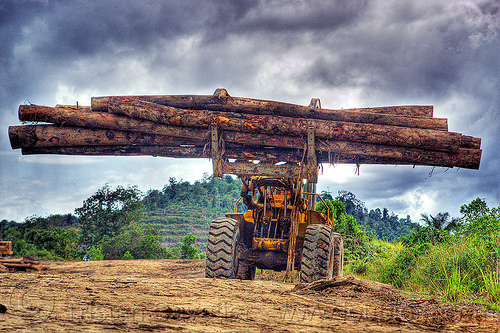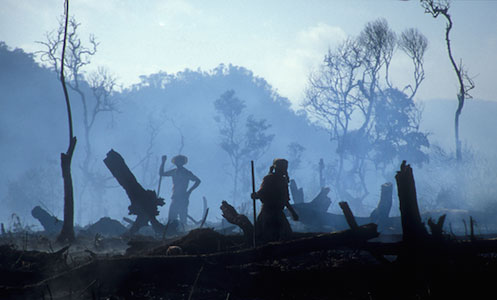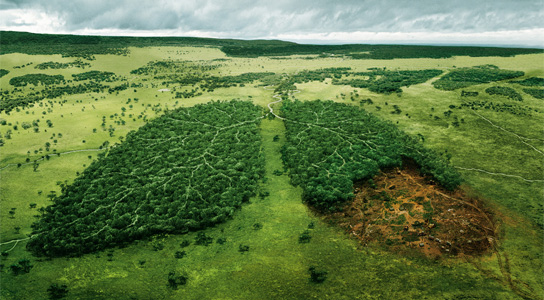A summary of public opinions on deforestation can be found at Debate which has found that 81% of people think we should stop deforestation.
The Stakeholders
- Conservationists - the ecosystems of the rainforest are unique, precious and could hold the solutions to current and future diseases. Deforestation causes irreversible damage to the face of the planet. They would argue that deforestation should not occur under any circumstances. However, wood is a vital for building and as fuel (it has been for thousands of years) so we could never not stop deforestation. Furthermore, can someone really claim to be a "conservationist" when the very fabric of everyday life is created through environmental destruction (whether deforestation, fossil fuel combustion, pollution)?
- Rural Individual - they have grown up surrounded by the forest. It is part of their livelihoods and culture. They value and understand the rainforest but still require wood for fuel and shelter. Is their chopping down of trees more justified than large scale deforestation?
- Sustainable Logging Company - deforestation on a large scale. However, they fell tall trees to allow smaller trees to grow or removes non-native tree species. This has beneficial effects on the rainforest. This has shown to be very effective with companies such as Georgia-Pacific and Stimson Lumber . On the other hand it is incredibly costly and inefficient. Often these companies only have a few sustainable projects in certain locations.
- Soy Bean Farmer - increased demand means more produce is needed and therefore more money is available. The rainforest is just a "waste" and the believe it should be chopped to allow expansion of farming. It is driven by profit. However, the world's population is predicted to reach 9.22 billion by 2075 (UN)so we are going to have to find space to meet the future demand for food.
 |
| Work to be done - large scale logging companies in Borneo (source) |
A summary of arguments for and against deforestation can be found at this interesting blog which discusses controversies. Just discussing a small selection of stakeholders (when in reality there are numerous more) shows the conflicting questions and issues that surround this topic. It is awful to think of the destruction of the natural world but do we really have a choice? Its a choice between tackling population growth with controversial anti-natal policy or sacrificing large portions of the natural world to feed the planet.
Case Study: Madagascar
Is deforestation justified in this location?
 |
| Farmers walk through part of a forest destroyed through slash-and-burn in rural Madagascar (source) |
Madagascar is an island nation of the East Coast of Africa known for its diverse and unique wildlife. It has been estimated that between 80-90% of forest has been lost since the arrival of humans several thousand years ago (McConnell and Kull 2014) with 50% of forest lost by 1950 (Alnutt et al. 2008). There is an expanse of academic literature into deforestation within Madagascar (Agarwal et al. 2005; Brinkmann et al. 2014; Brooks et al. 2009). Deforestation is such a problem in Madagascar because of increases in illegal logging driven by extreme poverty and corrupt local governments. It is easy money for poor local people and a lack of monitoring and bribery means people are rarely caught or get away with it. Conservation is therefore difficult because of complex politics which involve different stakeholders with different values (Scales 2012). An interesting concept put forward by Scales in his research into deforestation in Western Madagascar is whether indigenous/local people in Madagascar value the environment more than Western society. It is often assumed that because they have more "traditional" livelihoods that they appreciate and understand the environment and how precious it is. However, in Western Madagascar this is not the case with most local people exploiting the rainforest for private gain - but is this because they have no other choice?
Scales (2012) and Kull (2000) both reflect upon how population growth and poverty are exemplified as the causes of deforestation in Madagascar within conservation discourse. However, from reading these articles there is no interconnection between conservation practice and community development - surely the best way to stop deforestation is to remove poverty and provide an income for local people? Conservationists and people concerned with development should work together rather than in isolation.
Madagascar is different from the Amazon and Borneo in that illegal logging occurs on a smaller scale, undertaken by local people for a small source of income. In my opinion, it is entirely justified that poor individuals try to create an income for their family (even at the expense of the environment). It is bad practice by NGOs to try and conserve the environment prior to solving the causes of environmental degradation - trying to reduce poverty would solve more problems than putting a wire fence around a forest. It is important to continue to monitor and educate local people about deforestation so they understand the consequences that their actions are having. I am not suggesting that conservation is not important but rather that it should be incorporated into other development practices.
 |
| Will Madagascar's forests be lost forever? (source) |
This blog post has explored the complex issues surrounding different opinions of stakeholders within deforestation. It has partially answered whether deforestation is justified through the use of Madagascar as a case study. You can see why a poor individual in Madagascar (or any other part of the world) would resort to logging to feed their families and I don't think the use of a discourse to brand them "evil" is right. We should be helping.
I think from writing this blog I have discovered how entwined humans (in terms of development) and the natural world is.


